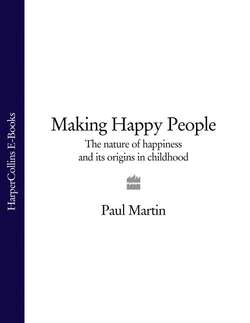Читать книгу Making Happy People: The nature of happiness and its origins in childhood - Paul Martin - Страница 24
5. Engagement in meaningful activity
ОглавлениеWe humans are by nature problem-solvers. We are generally happier when actively engaged in some reasonably challenging task, rather than passively witnessing other people’s experiences on a TV screen. Happy people spend at least some of their time engaged in meaningful and satisfying activities. Happy children socialise, play games or learn in the classroom; happy adults throw themselves into their jobs, hobbies, sports or voluntary work. The precise nature of the activity seems to be unimportant, provided it is reasonably demanding and worthwhile. Bored people with nothing much to do are seldom very happy.
Most adults spend a large proportion of their waking lives at work, so it is not surprising that paid work has an important bearing on happiness. Having a satisfying job is strongly connected with happiness. And, as with many other ingredients of happiness, the connection is two-way: job satisfaction contributes to happiness, and happiness in turn fosters job satisfaction. Happy people enjoy their jobs more. Despite media stories about work-related stress and the joys of downshifting, research shows that most people feel at least neutral about their job, and around one in three positively like what they do for a living. Noel Coward once opined that the only way to enjoy life is to work, because work is so much more fun than fun.
Work brings far more than just money. A satisfying job can also bring structure and meaning to one’s life, mental and emotional stimulation, personal relationships, regular opportunities to use and develop skills, social status, self-esteem and a sense of identity. Personal relationships are a particularly important benefit of work, and the evidence shows that people who work in small, cohesive groups tend to be the most satisfied with their job and generally happiest.
Pay, on the other hand, has a surprisingly weak influence on job satisfaction – certainly when compared with personal relationships or the nature of the work itself. People doing unpaid voluntary work often enjoy it more than people who are paid to do something similar. In fact, research shows that pay is more often a cause of dissatisfaction than satisfaction. Individuals who regard themselves as poorly paid relative to others soon become disgruntled, whereas better pay does surprisingly little to boost satisfaction. People who are highly successful at work typically report enjoying their job for its own sake, not because it is well paid.
The strength of the correlation between job satisfaction and overall happiness varies between different cultures. Among Americans of European origin, job satisfaction is closely linked to overall happiness and to satisfaction with other spheres of life, including satisfaction with marriage, finances, family and health. But the link between job satisfaction and overall happiness is found to be weaker among African-Americans and Asian-Americans. In some cultures and ethnic groups, individuals appear to derive more of their happiness from other areas of life such as their family; jobs are regarded more as a source of income and therefore make a smaller contribution to overall happiness. In highly individualistic societies like the USA, self-worth and happiness derive more from personal achievements and less from being part of a group.
For the same reasons that work provides many ingredients of happiness, unemployment is a powerful cause of unhappiness. Large bodies of evidence confirm that unemployed people are generally much less happy and much less healthy, both mentally and physically, than people with jobs. On average, they experience more depression, more anxiety, lower self-esteem and greater unhappiness than people in employment, even those with low-paid jobs.
The consequences of unemployment extend far beyond the purely financial. In most cases, the psychological, emotional and social effects are much greater. Even in countries where the unemployed receive generous state benefits, they are still very unhappy. Making up for lost wages softens the blow, but only slightly. Unemployment can be particularly damaging for those who have the furthest to fall, notably the middle-aged, the highly educated, and those living in areas of low unemployment where their change in status is more apparent. Unemployment even reduces the happiness of those who remain in work, because it heightens their anxiety that they too might lose their job. Any government that truly wants to promote national happiness should give a high priority to minimising unemployment.
